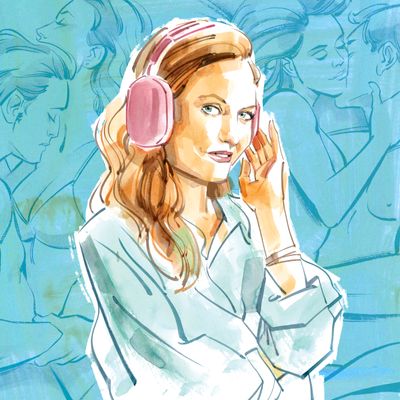
Minding Our Business: A series on what it takes to work for yourself.
The idea for Quinn, the audio erotica app that caters to female pleasure, came from the place that all great ideas do: Tumblr. The year was 2019, and Caroline Spiegel was a college senior at Stanford studying computer science. When she discovered audio erotic content online, she decided to start a blog of her own for her close friends and sorority sisters. “It went viral in my sorority because everyone loved it. No one had ever heard of audio erotic, audio porn before,” she tells me. “Tumblr walked so Quinn could run.” Three years later, Spiegel’s Tumblr of reblogged audio erotica has grown into an app full of original content that had 740,000 user sessions in September alone.
All audio tracks on Quinn are essentially some really hot, dirty, NC-17 voice acting. The app is, and will likely remain, strictly audio, which allows the platform to offer only “ethical porn,” which for Spiegel essentially means that “no one is actually having sex and no one’s being paid to have sex.” Quinn employs contractors to write and perform stories — known on the app as “Voices” — who post under an alias. Bad Influence, one of Quinn’s most popular voices, has posted 79 audios that have racked up over 1 million plays. The app also has a strict ban on “rape, minors, incest, and animals” (but don’t worry, vampires and “human creatures” are allowed), and all sex acts described must be completely consensual.
Quinn currently operates on a subscription model with users paying $4.99 per month for unlimited access to the app’s content, which includes guided masturbations, curated playlists, and a new original series, The Inventor’s Apprentice, voiced by Gossip Girl star Thomas Doherty. The app also offers users a community. Quinn is active on Instagram and TikTok, where the company frequently hosts Q&As. “People will even ask us, ‘How do I say ‘no’ in a way that’s still hot?’” Spiegel says regarding how Quinn’s emphasis on consent has impacted users. “No one wants to be mean, but you want to have boundaries. And we don’t get exposed to a lot of that language on a day-to-day basis.” But make no mistake: Quinn is not an app made to educate women on sexual health. In fact, the concept of “sexual health” is something Spiegel isn’t particularly interested in promoting. “I don’t think anyone masturbates because it’s healthy or boosts your metabolism,” she says. “In my opinion, doing something because it gives you pleasure is reason enough.”
What came first, the idea for your business or your desire to run a business?
I definitely had the entrepreneurial bug, but I didn’t have my heart set on doing a start-up. At the time, I was recovering from an eating disorder that I had throughout college, and one of the side effects of it was sexual dysfunction — anorgasmia — and the inability to orgasm or get wet or have a normal, healthy libido. In the process of dealing with that, I found audio erotica on Tumblr and Reddit and absolutely fell in love with it. It was the only thing that worked for me and accurately reflected how I felt desire. And then I started a Tumblr blog.
After the Tumblr blog started taking off, what was the first step you took toward making this a business?
I started asking a lot of friends, and people I liked and trusted, about the idea and asking them if they would use something like that. I asked them how they felt about their sex lives, masturbation, and porn and what they thought about the market. Were they using Wattpad? Were they using Tumblr? Were they using Pornhub? And then I actually started calling almost 100 women for more formal user research in the first few months of starting Quinn. It was right around that time that I dropped out of school because it became impossible to keep up with my homework.
How did you know what to do to put together a business plan and launch a business?
Google is the best thing, and you can learn how to do anything on YouTube. People assume that my brother [Snapchat founder Evan Spiegel] opened a lot of doors for me, but he’s never introduced me to an investor or adviser. I’m sure it helped that I was related to him, but I couldn’t ask him to introduce me to a roster of people.
I started fundraising first because I ran out of my savings. And it was a lot of cold outreach, and I just started pitching people. You don’t get a lot of replies from cold outreach, but you might get one. And someone might say, ‘Hey, this isn’t a fit for our fund, but maybe you should talk to so-and-so or so-and-so.’ And so I just kept bopping around and trying to get some money together, and eventually we raised $500,000 that first summer. And that was enough to hit the ground running.
Starting a business at 22, fresh out of college, is a lot of responsibility. How did you learn to be the boss of your own business?
I didn’t have employees when I first raised money or for the first year and a half of Quinn. We worked with freelancers and contractors, and then about nine months in, we hired two employees.
I’m still not ready to be anybody’s boss. I underestimated just how difficult and complicated it is to be a really good manager and boss. In the past year and a half, I’ve really started investing time in learning about management and leadership. At the end of the day, what’s most important is that you’re fair and reliable and kind and measured and not trying to be liked.
As a young boss, what is the guiding value for how you want to run the company?
Not giving customers, employees, or stakeholders what I think they want but what I think is the right thing that is in line with our mission and our values. It’s really hard as a young woman because you’re trained to people-please. I’ve started to realize that what people actually want is just straightforward communication.
Was there ever a point when you were trying to build this company and you just thought, Oh God, I don’t know if I can do it?
Some months, it feels like that every day. One piece of my journey has been realizing how important it is to normalize those ups and downs and realizing that I’ve felt this way before and I’ll feel like this again.
How do you avoid burnout?
My new mantra is “Rest, don’t quit.” I’m a big fan of asking myself, “Do I need a day off? Do I need to sleep for 12 hours tonight? Do I need to cancel my plans this weekend and give myself permission to veg out?” I’m not a big fan of self-care that is like punishment or that is a lot of work. I believe in true vegging, true stationary rest. That’s my cure.
More From This Series
- Anna Meacham Is a Problem Solver
- Working With Family Is Actually Possible
- They Started a Business While Bankrupt
